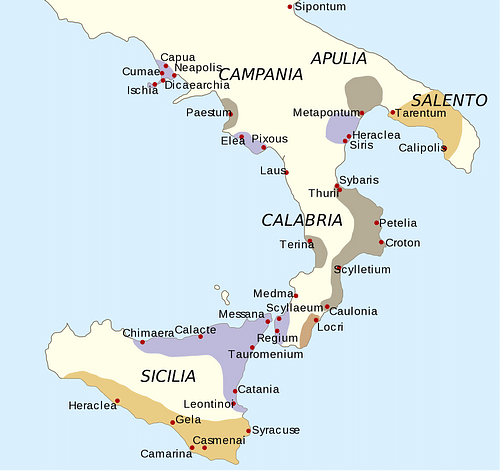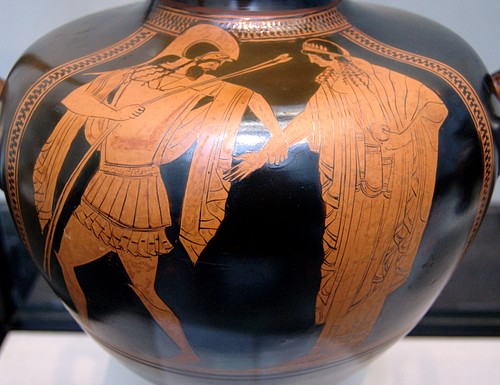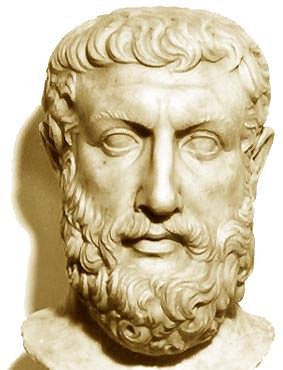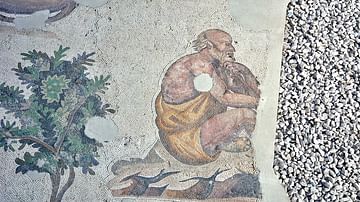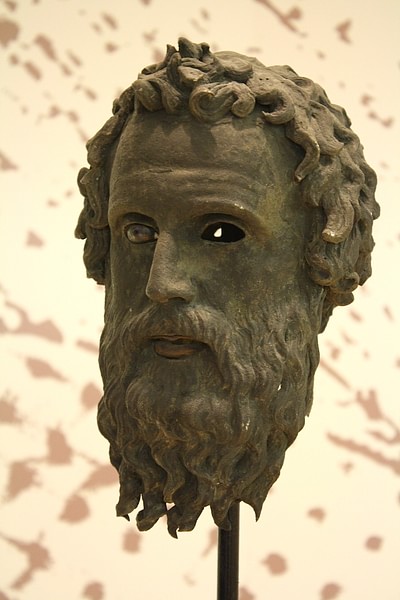
Gorgias (l. c. 427 BCE) was a Greek Sophist and philosopher, considered the greatest Rhetorician of his day. He is said to have created several aspects of public speaking still in use and to have mastered the art of persuasion, commanding high prices to teach it to others. He is best known today from the Platonic dialogue Gorgias.
His philosophy was based on the claim that nothing exists or, if it does, it cannot be truly known or, if it can be known, that knowledge cannot be conveyed to others and, even if it could be communicated, it would not be understood as intended. Gorgias made this claim based on the subjective nature of the human mind. Since all of reality must be interpreted by an individual, one person’s vision of “chair” will differ from another’s and, though each will assume the other has the same understanding of “chair”, this is impossible, and so accurate communication of concepts is impossible as well since the thought “chair” is not the same as an actual chair.
This claim, however, is contradicted by Gorgias’ own works and teachings in that he clearly believed he was able to communicate his concepts and that they would be understood as intended. This has led some scholars to speculate that his written works were ironic or satirical models only intended for teaching how to construct a persuasive argument (or as an advertisement of Gorgias’ skills) and the content should not be taken seriously. It is also possible that he made these claims to satirize the vision of the Eleatic School of Parmenides (l. c. 485 BCE) of existence consisting of a single, uncreated, indestructible substance. According to Gorgias, claiming to know what constituted existence was an absurdity and it was equally possible to claim – and prove – that nothing existed at all.
He was famously characterized as a charlatan by Plato (l. 428/427-348/347 BCE) in his dialogue of the Gorgias and, although popular in his time, his flowery style fell out of favor after his death and he was largely forgotten until the 19th century when modern-day philosophers began to take note of his claims regarding the nature of existence, the difference between thoughts and reality, and the impossibility of communication. He prefigured the Italian relativist writer and philosopher Luigi Pirandello (1867 to 1936) by 2,000 years in his claim that the words of one person cannot possibly be understood as intended by another and that everyone lives in their own reality created and maintained by their own interpretations of the world.
Life & Works
Gorgias' dates are often given as 483 to 375 BCE, but these are based on the only date recorded, 427 BCE, when he came to Athens as part of a delegation from Leontini, Sicily when approximately sixty years old. He is also said to have died at the age of 108 so, working from 427 BCE, his birth and death dates are established but these are approximations as his actual age in 427 BCE is unknown.
He was born in the Greek colony of Leontini, Sicily, and had a brother and sister. His father’s name was Charmantides, but nothing is known of his occupation or the name of his mother. He was well educated and is said to have studied under Empedocles (l. c. 484-424 BCE). Nothing is known of his life in Leontini, but he was already a respected rhetorician in c. 427 BCE when he was chosen as part of a delegation to Athens requesting military protection from the city-state of Syracuse.
Having succeeded in this mission, Gorgias remained in Athens and traveled to other city-states teaching the art of persuasion to the young men of wealthy families. Among these was Isocrates (436 to 338 BCE), the influential sophist who established his own school of rhetoric. Gorgias is also said to have instructed or influenced many of the leading men of Athens including Pericles (495 to 429 BCE) and Critias (l. c. 460-403 BCE). Some scholars claim he established sophism in Greece, emphasizing the importance of rhetoric in public speaking, and is also thought to have encouraged the use of elevated language and literary devices such as metaphor to engage an audience.
He is said to have been highly paid for his teaching which focused on the art of persuasion in “making the weaker claim appear the stronger” and supposedly was able to speak eloquently on any subject. He seems to have delivered speeches at the Panhellenic Festivals at Athens and was so well-respected that a solid gold statue of his likeness was erected at Delphi. He died at Larissa, allegedly at the age of 108, and four of Gorgias' works remain extant:
- On Nature (or On the Nonexistent)
- Encomium on Helen
- Apology of Palamedes
- Athenian Funeral Oration
All of these are characterized by Gorgias’ penchant for flowery language or macrologia, using more words than necessary to make one’s point, which he seems to have relied upon more than his fellow sophists.
Sophists in Ancient Greece
The term sophist derives from the Greek sophia (wisdom) and was understood to mean wiseman. These highly cultured wisemen traveled from city-to-city offering to teach others and receiving significant sums for their efforts. Their name became the root word for the English term sophisticated but, because they came to be seen as using language to deceive or manipulate, 'sophist' also lent itself to the term sophistry.
Gorgias was one of the best-known and most highly paid sophists of his time when other famous sophists were also at work, including Prodicus of Ceos (l. c. 465 - c. 395 BCE), Thrasymachus (l. c. 459-400 BCE), Protagoras (l. c. 485-415 BCE), and Hippias of Elis (l. c. 5th century BCE) who were contemporaries of the philosopher Socrates of Athens (l. 470/469-399 BCE) who differed from the others in that he never asked for payment in return for his teaching, maintained there was an objective Truth regardless of opinion, and did not claim to be able to make men better public speakers, litigants, or politicians.

This was the claim made by several sophists and many of them also made the same claim as Gorgias to be able to speak on any subject whatsoever and deliver a persuasive and moving oration. For a price, they would teach others their skills, and this was considered exceptionally valuable in ancient Greece where lawsuits were a daily affair and one needed to be able to defend oneself in court or advance a prosecution.
There was no such thing as a lawyer in ancient Greece. One was expected to represent one’s own case in court and, if one could not speak well, would have to hire a logographer to write a speech. Some sophists may have begun their careers as logographers (speech writers) before becoming itinerant teachers moving from city to city. Politicians, of course, also needed to be able to speak well in public and the upper-class fathers of young men were eager to sign their sons up for instruction in the art the sophists claimed to have mastered.
Although the sophists were highly regarded in their time, their reputation has suffered since, primarily owing to Plato’s harsh criticism of them as frauds who claimed knowledge they did not have and promised results they could not guarantee. A number of famous sophists appear as antagonists in Plato’s dialogues, including Gorgias, Protagoras, and Thrasymachus all of whom are made to look foolish by Plato’s skill in setting up their claims to be dismantled by Socrates’ dialectic.
Plato’s dialogues encouraged the view of sophists as deceitful manipulators and by the time of Isocrates they were known as rhetoricians, attached to a school, only claiming to be able to teach public speaking without the addition of imparting wisdom or making one a better person overall. The works of the sophists fell out of favor and, as with the Pre-Socratic Philosophers, now exist only as fragments. This makes it difficult to understand what their major teachings were or how the fragments would have been understood in context and this is especially true in the case of Gorgias.
Gorgias’ Rhetorical Works
Of the four fragments attributed to Gorgias, three are rhetorical works which provide models for the art of successful argumentation: Encomium of Helen, Defense of Palamedes, and the Athenian Funeral Oration. In the first two, the author seeks to persuade an audience to accept a generally unpopular opinion while, in the last, the goal is simply to honor the fallen and evoke an emotional response. The Encomium of Helen best illustrates Gorgias’ model of argument as it is a defense of Helen of Troy who, as depicted in Homer’s Iliad, left her husband Menelaus for the Trojan prince Paris and so started the Trojan War.
Helen was generally regarded poorly by the Greeks, but Gorgias presents a defense arguing that, based on Homer’s text itself, she was not to blame for the conflict. He cites four possible reasons for Helen’s actions:
- Physical Force
- Love
- The Will of the Gods
- Verbal Persuasion
If Helen was abducted by physical force, then she was not to blame because she was the victim, not a willing participant. If she left Menelaus for Paris willingly because she had fallen in love with him, she was not to blame because Love was considered a divine force which humans could not resist. If the gods willed that Helen should leave Menelaus for Paris, she was not to blame for this same reason, as no mortal will could stand against that of the Divine. If she left Menelaus owing to the powerful verbal persuasion of Paris, she also could not be blamed because words were understood to carry significant power and could convince one to behave contrary to one’s personal inclination.
Gorgias’ uses the same technique in his Palamedes, this time focusing on the mythical character of Palamedes who was responsible for involving Odysseus in the Trojan War. When Menelaus was gathering his noble allies to attack Troy and retrieve Helen, Odysseus, king of Ithaca, feigned madness, hitching a donkey and an ox to his plow and weaving about his fields erratically to avoid service. When Palamedes came to fetch him for the expedition, he knew Odysseus was only pretending and so placed Odysseus’ son, Telemachus, in front of the plow and when Odysseus moved to avoid him, his ruse was revealed. Later, Odysseus accused Palamedes of treason for conspiring with the Trojans and he was executed but Gorgias’ speech, featuring Palamedes as narrator, defends him against the charge and shows how unfairly he was treated and how poorly remembered.
On Existence & Knowledge
These two works, Encomium of Helen and Defense of Palamedes, are thought to have been showpieces demonstrating Gorgias’ ability to persuade an audience against their will since both Helen and Palamedes were viewed in generally negative terms. His work On Nature, however, presents problems in interpretation because it could have been written for the same reason as the two above, might be a serious philosophical statement, or could be a satire of Parmenides’ claim to knowledge of the nature of existence.
Parmenides claimed that What-is cannot come from What-is-not and, since What-is existed, it had to have come from something but, since it could only have come from what it is like, it must have come from itself and was therefore uncreated, of a single substance, and immobile because, if it could be subject to change, it would not then be itself. Gorgias’ answer was that nothing exists because, if anything does exist, it must be Being or Not-Being but Not-Being does not exist and, if Being exists, it would have to be eternal (as Parmenides said) or created.
If it were eternal, it would have no beginning, end, or position and nothing can exist that has no place so Being did not exist and, if being did not exist, nothing exists. If Being was created, there would have to be a Creator and, since nothing could come from what it was not like, the Creator would be the same as the Creation which would bring one back to it having no position and so no existence.
Even if Being did exist, it would be inconsequential to the human condition because it would be incomprehensible and incommunicable. Gorgias claimed that concepts existing in the mind do not correspond to reality – “thought” is not the same as “what is thought about” – and everyone’s thoughts are different. One person’s concept of Being would, first, not necessarily correspond to true Being but, second, would only be accessible to that individual since their vision of Being could not be correctly conveyed to someone else. It is also possible that one’s understanding of Being is a complete fiction because humans are able to imagine things that do not correspond to objective reality. Gorgias writes:
Many things thought about are not realities: we can conceive of a chariot running on the sea or a winged man. Also, since things seen are the objects of sight, and things heard are the objects of hearing, and we accept as real things seen without their being heard, and vice versa, so we would have to accept things thought without their being seen or heard; but this would mean believing in things like the chariot racing on the sea. Therefore, reality is not the object of thought, and cannot be comprehended by it. Pure mind, as opposed to sense-perception, or even as an equally valid criterion, is a myth. (Sextus Empiricus 1.3.B3/Baird, 45)
Claims by Parmenides and other philosophers that truth could only be apprehended by pure mind (reason) are a myth because one is claiming that the mind is capable of comprehending reality objectively but, since human beings are bound by subjective interpretation, they can only comprehend what their subjective understanding allows. Even if one could claim that reality is comprehensible, it would be incommunicable because thought does not equate with perceptible reality and words do not correspond to thought:
That with which we communicate is speech, and speech is not the same thing as things that exist, the perceptibles, so that we communicate not the things which exist, but only speech; just as that which is seen cannot become that which is heard, so our speech cannot be equated with that which exists since it is outside us. Further, speech is composed from the percepts which we receive from without, that is from perceptibles, so that it is not speech which communicates perceptibles, but perceptibles which create speech. Further, speech can never exactly represent perceptibles, since it is different from them and perceptibles are apprehended each by the one kind of organ, speech by another. Hence, since the objects of sight cannot be presented to any other organ but sight, and the different sense-organs cannot give their information to one another, similarly, speech cannot give any information about perceptibles. (Sextus Empiricus 1.3.B3/Baird, 46)
How these claims were meant to be understood, as noted, is unclear. Gorgias was well-known for his ability to discourse on any subject and for his powers of persuasion so, clearly, he believed that one could communicate something about objective reality to others and, further, that an objective reality existed as a reference point for his arguments. He was most likely only trying to demonstrate the technique Plato criticized as “making the weaker appear the stronger argument” and thereby display his rhetorical skills but this interpretation is speculative; it is equally possible that he was making a sincere philosophical observation.
Conclusion
Plato’s Gorgias presents the sophist as a manipulative fraud when Socrates forces Gorgias to agree that an uneducated audience is easier to convince than a group armed with knowledge and facts. Socrates repeatedly asks Gorgias what, exactly, it is he teaches, and Gorgias evades the question with flowery answers before admitting that he teaches the art of persuasion which relies on manipulation of an audience through their cultural beliefs, instead of a reasoned argument based on facts, and the ignorant are easier to persuade than the educated. Whether this portrayal depicts the views of the actual Gorgias is unknown but seems unlikely based on the extant fragments, especially the Helen, as Gorgias clearly relies on facts and reasoned argument in this work, the beliefs of his audience ran counter to his claims, and he relies on a given level of education in the audience to make his point.
In the modern era, interest in Gorgias was first revived by the German philosopher Georg W. F. Hegel (1770 to 1831) and English historian and scholar George Grote (1794 to 1871) who believed the sophists generally, and Gorgias specifically, had been unfairly maligned by Plato and later writers. They encouraged a revaluation of the sophists without reference to Platonic or Aristotelian criticisms which was supported by later thinkers and writers.
Luigi Pirandello, to cite only one example, combines the thoughts of both Gorgias and Protagoras in his plays which maintain that reality is a personal construct, anything is true if one believes it to be, and no one can actually communicate their reality to anyone else. Since the mid-20th century, the teachings of the sophists have continued to receive more serious attention and they are now usually included more objectively in any study of the Pre-Socratic philosophers and Greek thought.
